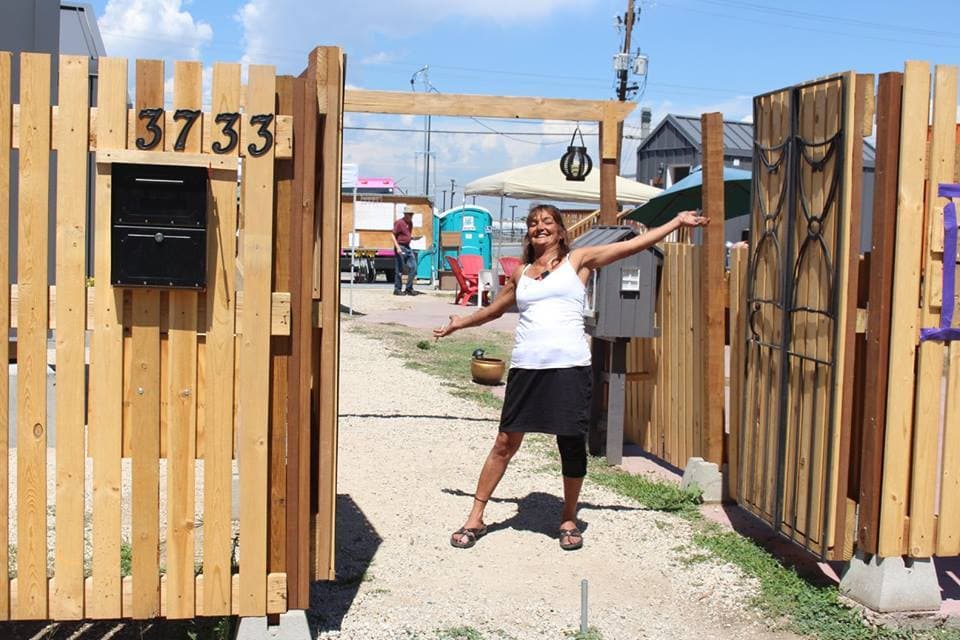As a teen, Rhonda Romero would take the bus from Commerce City into Denver to hand out sandwiches to people living on the streets.
As an adult, Romero experienced homelessness herself. She died this week after a brief illness, surrounded by friends and family who said she tried to help others even when she was struggling. She was 50.
Romero was among the first residents of Beloved Community Village, a dozen tiny homes she helped build in 2017. She was the first villager to move from Beloved Community, which is meant as transitional housing, to her own apartment. When she died Sept. 9 she was a member of the board of the Colorado Village Collaborative, the nonprofit that developed Beloved Community as a pilot. The city has embraced it as a model for more compact neighborhoods that encourage community and offer alternatives to traditional shelters and bridges to permanent housing.
"It's important to me because I was part of the beginning of it," Romero said in a video the collaborative produced last year. "I want it to go forward."
As a board member, Romero was an advocate in particular for the building of a tiny home village for women, said Nathan Davis Hunt of the Interfaith Alliance of Colorado, another sponsor of tiny homes. He said plans are underway for a women's village and called Romero "someone with experience of homelessness who could help lead us."
Cole Chandler, co-director of the Colorado Village Collaborative, said when he met Romero she was camping along the South Platte River.
"She was just a delight, just had a real vibrant, welcoming personality," Chandler said.
As Beloved developed, Romero had heard about plans for the village at 38th and Blake and came daily to help with construction over the summer of 2017, even before she was offered one of the tiny homes, Chandler said. Rochelle Martin, Romero's sister, wasn't surprised to hear about her sister donning a hard hat and wielding a hammer. When they were younger Romero was a tinkerer and once worked in a mechanic's shop, Martin said.
"She could do anything she really wanted to," Martin said. "And she did."
Rochelle Martin took some of those bus rides to Denver with her big sister. Martin said Romero seemed to feel connected to people experiencing homelessness.
Chandler saw it too.
"Rhonda just felt like people on the streets and people struggling were her people," Chandler said. "That's what she was passionate about."
Luna Raine said her fellow villager expressed compassion in another way.
"She had this little dog that she just took on," Raine said. "Not having a lot resources herself, but she took on that dog. And that dog loved her."
"She didn't go out and find Sparky. Sparky found her," said Raine, a founding resident of the village who still lives there.
Martin said her sister had brought stray pets to the family's Commerce City home when she was a child. Romero's teen years, when she started reaching out to people experiencing homelessness, also were the beginning of problems with alcohol that would persist and that sometimes strained relationships with her family, Martin said. Their mother's death in 2016 seemed to worsen her sister's depression and drinking, Martin said.
Raine said it was hard to watch Romero struggle.
"She didn't want anyone to hurt," Raine said. "Which is a shame, because I feel like she hurt so much herself."
Three months after moving into the village, Romero learned she had moved to the top of a waiting list for a subsidized apartment in City Park West.
"They finally got to her name," Raine said.
Chandler said Romero cried when she told the other villagers she had keys to her own apartment.
"I don't want to leave you all," she said.
It was an important moment, Hunt said.
"The village isn't a permanent home, but it's a place to find community, be stable," he said. "And that's exactly what happened for Rhonda."
She lived in the apartment for about two years before her death. Meanwhile, she kept her ties to the village, not only serving on its sponsor's board but returning to cook for residents and do chores.
"You'd find Rhonda there at the village just cleaning for the heck of it," Chandler said.
In a Facebook post the night of her death, Hunt of the Interfaith Alliance wrote that Romero "fled addictions, fled who knows what all ... she was truly one fighting a great battle beyond my knowledge, as all are. But wherever she showed up, she brought care and encouragement. She was always sharing food, always loving on others, always taking folks in."
Hunt, along with former and current village residents, was at the hospital with Romero when she died. He wrote of watching her family stroking her head and thanking "her for taking care of so many people for so long."
Martin said friends of her sister told stories she heard for the first time at the hospital, saying, "Oh, I love her so much. She's done this for me. She's done that for me.
"It felt good to have that group of people there when she passed."












